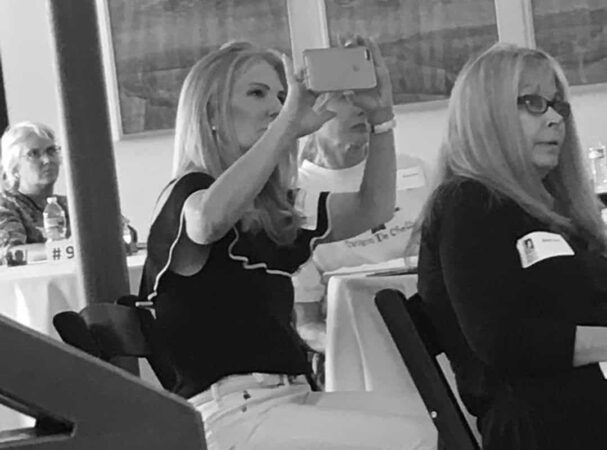The Clark Hulings Foundation Has Discovered the Secret Sauce for Visual Artists’ Entrepreneurial Success
Report on the Working Artist Proves Business Education for Artists Leads to Their Success and Thriving Communities
Santa Fe, New Mexico – Today, the Clark Hulings Foundation (CHF), the only national nonprofit dedicated to helping visual artists succeed as independent entrepreneurs, has released its first research report, the Report on the Working Artist. The report is a comprehensive assessment of the circumstances, contributions, and needs of professional visual artists in the US, as well as a thorough examination of the ingredients necessary for their success.
The report arrives at a pivotal moment in the country’s recognition of the vital role that working artists play within our communities, culture, and economy. CHF is so committed to broadening the entrepreneurial ecosystem to acknowledge, welcome, and equip artists, that they’ve released a first of its kind research report demonstrating how exactly that works.
CHF’s Co-Founder and Executive Director Elizabeth Hulings notes, “We are just a scrappy, upstart not-for-profit, yet we’re the ones telling the true tale of this country’s independent creative sector and its powerful potential that’s hiding in plain sight. It’s when we support and respect the artists and inventors among us that we foster the kind of creativity that enables us to take big strides—to go to the moon and cure polio and develop the Internet and the iPhone—because that support and respect permeate our culture and society. Creativity begets creativity. People heal better, feel better and think better when they have art in their lives, and we absolutely need it to tackle the huge issues we face today.”
The report was spearheaded by CHF’s chief data scientist Daniel DiGriz who adds, “Artists are the untapped entrepreneurial source of innovation and energy. While manufacturing is in decline, energy volatile and goods are increasingly caught in the uncertain world of trade deals and tariffs, artists are an economic powerhouse that can fuel an uncertain economy, given the appropriate training and tools. Truly, where artists thrive, the economy thrives! We may have sensed this, but now CHF has proven it.”
Groundbreaking in both scope and depth, Report on the Working Artist is the product of 30 months of dedicated research and analysis by CHF’s data science team. It represents the first time that anyone has collated and analyzed extant research across arts organizations to examine the conditions facing working artists, and the many impacts these artists have on their communities. With this report, CHF is also the first to publish data on the impact of business education on artists’ careers as demonstrated across various art-business learning programs and multiple cohorts within those programs.
Some of the most exciting findings in the report include:
- Artists create jobs: 25% of working artists have hired someone to help them with their artist business
- Artists are savvy investors: 27% of working artists have reinvested over 50% of revenue from their art business back into their enterprise
- Working artists become intensely committed entrepreneurs: Those with training, are willing to commit between 25-50% more of their time to develop their art businesses.
- Behavioral changes: 67% of those working artists who receive concentrated business education take part in more events, obtain more media coverage, increase conversions from their marketing, and sell more art or gain more commissions.
- Bottom line outcomes: A whopping 75% increase their involvement in sales and marketing channels, track their sales more effectively, and (bottom line) increase their total income from making and selling art.
CHF’s report found that the economic success of professional visual artists does not have to be the stuff of fantasy, business education for artists really does move the needle. It is an attainable outcome, as long as certain basic steps are taken to overcome the systemic challenges artists face. Artists are entrepreneurs, and—just like entrepreneurs in other fields—they need business education and peer networks to thrive.
As the research shows, business-education programs that meet these professional needs produce prosperity for working artists and their communities. Artists who participate in entrepreneurial learning programs follow a measurable trajectory of change, from internal to external. First, they exhibit changes in attitude, as they build confidence in their ability to manage their art businesses and finances, and increase their clarity around career goals. Next, they change their behavior, increasing the time they spend on their businesses, and networking with peers and other industry leaders. Over time, these shifts lead to demonstrable changes in business results—increased contacts, sales, and commissions—and increased profit/revenue.
One of CHF’s recent Art-Business Accelerator Fellowship alumnas, Donna Lee Nyzio – an oil painter from North Carolina bears this out noting, “CHF’s Accelerator is like getting an MBA, with your art business being the thesis.” Adding “Yesterday was one of those days that makes your day as an artist and entrepreneur. First online sale over $1000, for a painting, but it was in a gallery, so I had to do some coordination and included the gallery in the client contact 100%. My new collectors emailed me a letter about my work so beautiful I was in tears. I am so Thankful for this year and for all I learned.”
Furthermore, the report shows that the impacts of concentrated business-education programs are not only measurable but also reproducible. When art-business education is offered in multiple formats, it can be scaled up to reach ever-greater numbers of artists, replicating their success across the country. In short, the stereotype of the starving artist is not destiny; there is a far better alternative, and it is completely within reach.
Finally, CHF’s Report on the Working Artist demonstrates the catalyzing role that artists play. When the prosperity of individual visual artists and groups of artists is boosted, the economic and cultural impacts of their success are felt near and far.







